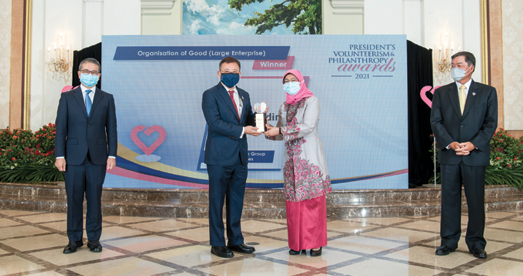
Building Sustainability
Read moreIn 2021, JC&C expanded the scope of its sustainability reporting by adopting the operational control approach of the Greenhouse Gas (“GHG”) Protocol to include the JC&C Head Office and its operational controlled businesses, namely Astra and the Cycle & Carriage businesses in Singapore, Malaysia and Myanmar. More information on our environment, social and governance (“ESG”) performance will be detailed in the Sustainability Report 2021 (“SR2021”) planned for publication in May 2022.
SR2021 is prepared with reference to the Global Reporting Initiative Sustainability Reporting Standards (“GRI Standards”), and adheres to the Singapore Exchange Listing Rule 711A on preparing an annual sustainability reporting, which describes sustainability practices with reference to the primary components set out in Listing Rule 711B on a “comply or explain” basis.
Our Sustainability Strategy
JC&C see the embedding of our ESG agenda into the business strategy as a crucial component for achieving our ambition to grow faster than Southeast Asia and elevate our communities. Being centred around three key pillars — climate action, social impact and governance — our ESG strategy enables us to deliver and secure long-term growth and sustainable value for our stakeholders.
2021 was a critical year in which countries and businesses across the globe made significant pledges at the United Nations Climate Change Conference held in Glasgow (“COP26”). Conversations held recognised the urgency to limit the increase in global average temperatures and accelerate collective climate action to achieve net-zero GHG emissions. Year-long engagements on this topic motivated us to embed ESG considerations deeper into our business operations.
As an example, early in the year, we embarked to align ourselves to the Task Force on Climate-related Financial Disclosures (“TCFD”) framework. By conducting scenario analyses on both our physical and transitional risks, we gained a deeper understanding of the climate risks faced by our businesses. Moving forward, we look to build overall climate resilience within our portfolio through mitigation and adaptation measures. For further information on the Group’s climate-related risks, please refer to our Climate Change Report 2021 to be published in the first half of 2022.
Our social strategy continues to support and contribute to the three United Nations Sustainable Development Goals: Good Health and Well-being (SDG 3), Quality Education (SDG 4) and Decent Work and Economic Growth (SDG 8).
Corporate governance has always been a bedrock for us. We strive to provide our stakeholders with the transparency needed to make informed decisions. In 2021, we increased our frequency of engagement with ESG rating agencies to gain a deeper understanding of the fast-changing dynamics and requirements of operating in a modern environment.
Our Sustainability Governance
Integrating sustainability at the highest governance level enables a strategic oversight for our long-term value creation. At JC&C, the board of directors (the “Board”) has the overall responsibility for the Group’s ESG mandate and performs this duty within a robust governance framework. The Board exercises their oversight through regular board meetings where they are updated by the JC&C executive leadership team (“Excom”) on the progress of JC&C’s sustainability strategy and any key ESG-related issues. The Board-level Audit Committee is responsible for overseeing the management of risks faced by the Group, including climate-related risks.
The Excom is responsible for shaping the Group’s sustainability strategy and ESG considerations are factored into management’s performance incentives. The Excom is directly involved in leading any environmental or social assessments for the Group and incorporates ESG-related risks into the annual budget discussions, overall business strategy and capital allocation plans.
JC&C’s ESG agenda is executed by its management-level Sustainability Committee. This cross-functional committee was established in 2021 and convened quarterly to set the direction and plan Group-wide initiatives, such as the transition towards a low-carbon economy as well as the setting of ESG-related goals and targets. The committee is supported by the Sustainability Working Group that meets monthly to discuss sustainability-related issues and action on the roadmap set out by management.

Approach to Materiality
Acknowledging the changing macroeconomics landscape and stakeholders’ needs, we conduct a materiality review every year to ensure that our sustainability efforts across each aspect of ESG aligns with the key issues of our businesses and stakeholders. This assures stakeholders that our sustainability strategy is focused on making the most impactful change.
2021 Material ESG Factors
| Governance & Economic | Environment | Social |
|---|---|---|
| Commitment to anti-corruption and anti-bribery practices | Carbon emissions and electricity consumption management | Socioeconomic support for local communities |
| Accountability, openness and transparency | Waste management | Staff diversity and equal opportunities |
| Responsible investing | Water management | Employee safety and well-being |
| Talent training and development |
Materiality Topics
We identified ten material topics for 2021 under the three ESG pillars and made the following changes to the materiality topics:
With the changes to the material topics, a total of five associated GRI topics (i.e. GRI 302 Energy, GRI 303 Water and Effluents, GRI 305 Emissions, GRI 306 Waste and GRI 207 Tax) were added to 2021’s reporting.
Environment
2021 was the first year we embarked on measuring the Group’s environmental impact, starting with the head office and our subsidiaries. JC&C is committed to assessing the associated risks, and being a part of the solution for climate change through mitigation actions as well as sustainable and resilient investment decisions. We see GHG emissions and energy consumption as some of these risks, and therefore are actively working with our businesses to align on an overall decarbonisation plan.
Social
JC&C supports and invests in mental health through the Jardine Matheson Group registered charity, MINDSET Care Limited (“MINDSET”). MINDSET helps the mental health community by raising awareness and supporting the social reintegration of people with mental health issues through employment opportunities and social enterprise initiatives, as well as fundraising and allocating resources to related projects and programmes.
In partnership with other Jardine Matheson companies in Singapore, our total contributions to mental health include:
| JC&C Group | Jardine Matheson Group# | |||
|---|---|---|---|---|
| 2021 | From 2011 to 2021 |
2020 | From 2011 to 2021 |
|
| Total funds donated and committed to mental health programmes* | S$457,000 | S$2.4m | S$1.2m | S$8.8m |
| No. of employee volunteer hours | 515 | 9,291 | 3,382 | 47,287 |
#Including business associates and employees
*Including total pledged and ad hoc donations

2021 marked MINDSET’s 10th year in leading the way as a corporate partner in Singapore’s mental health community. During the year, the Jardine Matheson Group was named the Organisation of Good in the Large Enterprise Category at the President’s Volunteerism & Philanthropy Awards 2021 for its contributions to the mental health sector through its charity MINDSET. The pinnacle award and platform recognises individuals, organisations and leaders of good for achieving excellence in giving and represents the highest honour for contributing to the community in Singapore.
To further build confidence and trust among the donors to our cause, MINDSET upholds high standards of governance and transparency. For four consecutive years, it has been awarded the Charity Transparency Award for exemplary transparency and governance standards.
With the view that mental health is as important as physical health, JC&C is committed to upholding good standards for the mental well-being of our employees alongside adhering to the Singapore Tripartite advisory on mental well-being at workplaces. We are also a part of One Mind at Work, which advocates good mental health at the workplace.
Employees are supported by various mental health-related initiatives, such as the Employee Assistance Programme that provides free and anonymous counselling via a 24-hour hotline. JC&C has also curated mental health training for line managers and employee volunteers to spot signs of distress among employees and support those affected. In addition, mental health consultations and treatments are covered under outpatient benefits.
Governance
We believe that strong corporate governance is integral to the Group’s success and our continued commitment to this is reflected in our 2021 ranking results. JC&C achieved an overall rank of #19 in the Singapore Governance and Transparency Index published by the National University of Singapore Business School, which provides corporate governance performance ratings for Singapore-listed companies. JC&C continues to be positioned within the top 5% of Singapore’s listed companies in the corporate governance ranking.